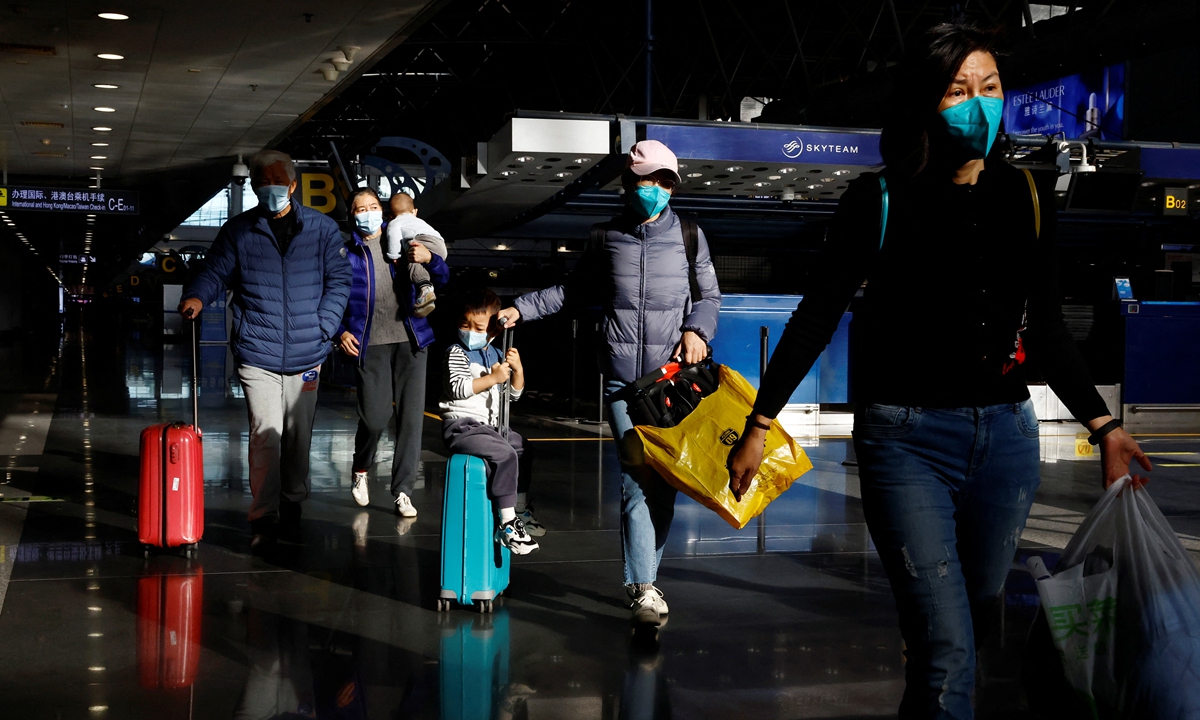
Travelers flock to Beijing Capital International Airport on December 27, 2022 as China further optimizes its anti-COVID measures. Photo: IC
China's Ministry of Foreign Affairs announced on Tuesday that starting from January 8, 2023, when the country begins to downgrade the management of COVID-19 from Class A to Class B, nucleic acid tests will no longer be carried out on people entering the country, and that those with normal health declarations will no longer undergo any special process.
China will gradually resume the entry and exit of passengers and commercial transport at land ports based on comprehensive assessment, the notice said.
The ministry also said that it will further optimize arrangements for foreigners returning to China for work resumption, business, study, family visits and reunions, and provide visa facilities accordingly. Also, in light of the international epidemic situation and the service support capacity of all sectors, China will plan to resume outbound tourism for Chinese nationals in an orderly manner.
According to the ministry, China will lift the load factor limit for international flights and increase the number of flights in phases. At the same time, airlines are requested to continue to prevent COVID-19 infections on board, and passengers are required to wear masks.
According to the notice of interim measures for personnel exchanges between China and foreign countries issued by the ministry, persons with abnormal health declaration or fever and other symptoms shall still be subject to antigen detection by Customs.
If the results are positive, asymptomatic infected persons without serious underlying diseases or mild cases can enter home quarantine or manage their own care. In other cases, individuals are recommended to report to a hospital for diagnosis and treatment as soon as possible. If the results are negative, the Customs shall conduct routine quarantine inspection in accordance with the related laws and regulations.
To meet surging demand for cross-border tourism, China's National Immigration Administration is set to resume the processing of Chinese mainland residents' exit endorsements for travel to the HKSAR starting on January 8.
Both inbound and outbound demand travel immediately started to skyrocket on Tuesday. According to data released on Tuesday by the Chinese major travel agency Ctrip, inbound ticket orders to the Chinese mainland rose 412 percent from the same period on Monday, and they were 1.6 times higher than outbound ticket orders. The average price of inbound air tickets rose 8.6 percent month-on-month.
Ctrip said that a rush back from the West is underway, and it is price-insensitive, noting that this trend is likely to see a gradual increase as cross-border travel continues to pick up.
Data from Ctrip also showed that the impact of the new policy on travel spending was swift. Within half an hour following the policy announcement, the number of searches for popular overseas destinations on Ctrip's platform surged by 10 times, and searches for outbound air tickets and overseas hotels (including those from China's Hong Kong and Macao special administrative regions and Taiwan region) reached three-year peaks.
Singapore, South Korea, Japan and Thailand as well as the HKSAR saw the highest growth in air ticket orders, becoming the top five most popular destinations for Chinese, according to Ctrip.
A staff member of the Beijing Customs District told the Global Times on Tuesday that the office is much busier receiving consulting calls and it is well-prepared to welcome a boom of cross-border travelers.
The staff member noted that inbound travelers only need fill in the health declaration form upon arrival or in the WeChat program, and there are no requirements for nucleic acid testing and vaccination history after arrival.
After China made the much-anticipated decision to resume international tourism, the French Embassy in China said on Sina Weibo that "Chinese friends, France welcomes you with open arms!"
The US Embassy in China announced that the Beijing, Guangzhou, and Shenyang consular sections will resume regular consular services on January 3, 2023.
However, Japanese Prime Minister Fumio Kishida said on Tuesday that Japan will strengthen border control steps against travelers from China. Japan will require travelers from the Chinese mainland to take tests for COVID-19 upon arrival, starting from Friday, Kishida told reporters, Japanese media reported.
In response to Japan's move, Wang Wenbin, spokesperson for the Chinese Foreign Ministry, said at Tuesday's press briefing that since COVID-19 began three years ago, the Chinese government has refined the response measures by keeping them science-based, targeted and responsive to the evolving situation and has effectively coordinated COVID response with economic and social development, contributing significantly to global solidarity against the pandemic and world economic recovery.
"The current COVID situation in the world continues to call for a science-based response approach and joint effort to ensure safe cross-border travel, keep global industrial and supply chains sable, and restore world economic growth. We believe that COVID response measures need to be science-based and proportionate without affecting normal people-to-people exchange," Wang said.
Given that COVID-19 cases surged in China, some Western media have hyped that the epidemic in China could spark a "dangerous new variant that infects the world" in an attempt to play their old tricks - smearing China's COVID policy.
Chinese leading medical experts debunked these accusations, saying that China has been in a low epidemic situation during the past three years while many other countries and regions - especially the US - suffered from a COVID tsunami. China has also been facing great risks from imported cases over the past years when the country has been sparing great efforts to protect people's health and lives while minimizing the impact of epidemic to society under the dynamic zero-COVID policy.
The number of COVID-19 cases and deaths in China remains among the lowest in the world, the national health authority said Tuesday, noting that people's lives are safeguarded by sparing no effort to save critically ill patients and providing targeted medical services to key groups.
Now when China is on track to resume cross-border tourism, some Western countries and regions again adopted their double standards, trying to criticize China's new measures although they were the ones previously keeping calling for China to loosen its grip.
A Chinese respiratory expert, who requested anonymity, told the Global Times on Tuesday that scrapping the border restrictions is timely and reasonable after the country has greatly eased its COVID measures domestically and the resumption of cross-border tourism is unlikely to have much impact on domestic epidemic.
"Some Western media claimed that China's border resumption will disrupt the world and cause virus mutations, then I would like to ask why they previously decided to reopen their borders and now in return try to blame China's border reopening," the medical expert questioned.


